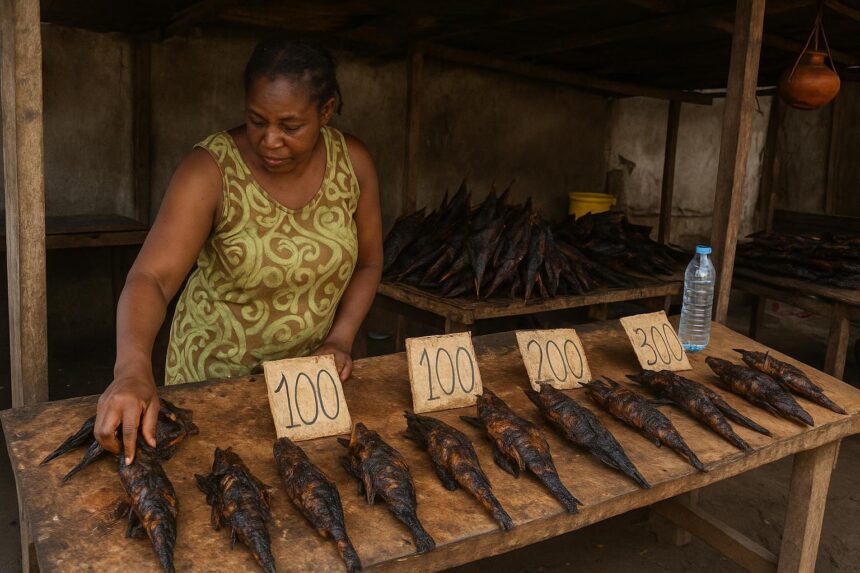Tax-free relief arrives
Sunday’s circular from the Ministry of Economy and Finance brings welcome news to shoppers across Brazzaville and Pointe-Noire: for the next twelve months, many essential foodstuffs will cross borders free of customs duty, IT fees and value-added tax.
Minister Jean-Baptiste Ondaye, who signed the document, explains that the measure targets wheat, refined vegetable oil, frozen meat and fish, salted fish, rice, powdered milk, fertilisers, animal feed and seeds—items whose abrupt price swings have weighed on household budgets since 2022.
Under the decree, customs chief Guénolé Mbemba is tasked with ensuring the new tariff code is applied swiftly at ports, airports and land borders, a logistical challenge that will test the coordination between the Directorate General of Customs and importers’ clearing agents.
Dependence on imports
Although the Republic of Congo boasts an estimated ten to twelve million hectares of arable land, national farms still satisfy only a fraction of demand. Official accounts put the import bill for food at between 500 and 700 billion CFA francs each year.
Every spike on the global commodity market is therefore felt immediately in neighbourhood stalls. Since the conflict between Russia and Ukraine disrupted grain routes, the price of a standard baguette in Brazzaville has risen from 150 to 200 francs, bakers note, straining modest salaries.
By removing border taxes that could add tens of francs to every kilo, authorities expect wholesalers to unload containers at a lower cost and, crucially, to pass those savings on to consumers rather than absorb them as extra margin.
One-year Resilience Plan window
The exemption is strictly limited to a twelve-month period, timed to coincide with the first phase of the government’s Resilience Plan, a programme launched in 2022 to cushion households against imported inflation through targeted subsidies, stockpiles and support for local production.
Importers welcomed the announcement yet requested clarity on administrative timelines. “If exemption certificates take weeks to issue, vessels will still incur demurrage costs,” warns Serge Oba, spokesperson for the Union of Freight Forwarders, who asks for a simplified digital platform to accelerate approvals.
“Today’s circular is one of the concrete steps we were expecting before citizens can feel the plan’s positive impact,” says Mermans Babounga, who heads the Congolese Consumer Rights Observatory, a civil-society group that has long demanded price transparency from distributors.
Babounga acknowledges the decree may not instantly slash market prices, warning that existing inventories purchased under the old tariff will first be sold. Still, he believes the signal is strong enough to deter speculative hoarding and send a message of government vigilance.
Market reactions in Brazzaville
At Moungali’s bustling Marché Poto-Poto, trader Adèle Ngoma stacks bags of imported Thai rice. She pays cash to clearing agents before the goods even leave Pointe-Noire port. “If the paperwork really gets cheaper, I can lower my price by at least 50 francs,” she says.
Behind her stall, butcher Dieudonné Nlandu unwraps cartons of Brazilian chicken legs. Fuel surcharges, he notes, already erased part of this month’s margin. “I wait to see if transporters cut their fare after the tax break. Otherwise, customers will not feel the difference.”
On social networks, young influencers are posting “before-and-after” receipts to track changes. Their real-time data, though informal, could become a crowd-sourced barometer of policy success, echoing similar initiatives observed during the pandemic’s early supply-chain shocks.
Toll fees under scrutiny
For many truck drivers, the toughest cost remains inland, not at the quay. The National Road 1 linking Pointe-Noire to Brazzaville stretches a little over 500 kilometres but hosts seven toll gates, each charging fees that carriers consider high.
Consumer advocate Babounga argues that waiving or reducing tolls on vehicles transporting staple foods would complement the tax holiday. He estimates that removing a single 5,000-franc fee can shave another 10 francs off the retail price of a kilo of rice up-country.
Transport ministry officials say the matter is under review, noting that toll revenues finance highway maintenance. Any adjustment, they insist, must preserve road safety budgets, especially with heavy rains forecast for the next season.
What lies ahead for prices
Economists at the University of Marien-Ngouabi predict the exemption could lower overall urban inflation by up to one percentage point if fully transmitted to consumers. The figure may seem modest, they say, but would represent significant breathing space for low-income families.
The government meanwhile continues to highlight medium-term goals: modern irrigation, feeder roads and credit lines for cooperative farmers. Officials argue that boosting national harvests remains the surest way to shield the population from unpredictable external shocks.
For now, shoppers will watch price boards with renewed attention, hoping the new policy translates into cheaper meals on their tables. A review of the measure is scheduled in twelve months, offering policymakers a chance to fine-tune Congo’s fight against the cost of living.






















